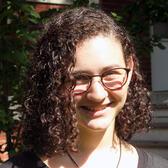Learning to Pray: Personal, Painful, Passionate
Until last winter, the only prayers I knew were those in the books I studied with my mom and the rabbi at my synagogue. I discovered spirituality in nature and found a home in Jewish community and tradition, but I never truly prayed. I didn't know how it felt to speak directly to G-d. Of course, I knew that people did it—I'd watched firefighters find religion in the face of the worst southern California summer fires, and I'd read Are You There G-d? It's Me, Margaret multiple times, but I’d never really thought that someone out there was actually listening.
It wasn't a fire or some other disaster that taught me to pray. It was a text message I received just before Shabbat from one of my closest friends: a non-religious gay boy who, until that week, had stoically refused to be defined by his chronic anxiety and depression.
I learned to pray on Friday, February 24th, 2017. This was the day my friend told me over text that he'd been to the doctor, and that if he lost any more weight due to his eating disorder, he would be hospitalized.
In the days and weeks that followed, I became his cheerleader, his alarm clock, and his mother. When I stood in tefillah on Sundays with the first-grade religious school class I helped teach, I pleaded with the sanctuary's ceiling and hoped that someone was listening, that some greater power in the universe existed, and that this power cared. I let go of the words I trusted, and held only the picture of my friend, alive and healthy, in my mind.
I've thought a lot about why I became so consumed by the need to know that my friend was safe. Naturally, I want my friends to be alive and happy, but this was different. Every morning when I woke up, my first thought was to talk to him, to make sure he had survived the night. My own mental health began to go downhill.
I would wake up in the middle of the night from dreams that my friend was in the hospital, dying. Every time, there was some way that I could’ve saved him, but I always failed. Each dream seemed more realistic than the last. I dreaded going back to that place in my subconscious every night, so I stopped sleeping. I crawled into bed only three hours before my alarm would go off, giving myself just enough rest to get through the next day, but not enough to start dreaming.
On nights I did sleep, dreams continued to wake me up. I wanted to call him, just to know he was alive, but at two in the morning I knew he had probably just gone to bed, and he needed sleep more than I did. Instead, I sat in bed with tears running down my face, and I prayed. I didn't read any words; I couldn't speak at all, beyond the word "please" whispered desperately into the comforter pressed against my face.
I argued constantly with classmates who accused him of being lazy or overdramatic—they didn't know what it was like, I told myself, to fight with their own minds. I did. In one such encounter, a classmate complained that my friend was just "being a little girl," referring both to his eating disorder and the fact that he was brave enough to share information about his condition with those around him. I fought back, of course, but I'm still disturbed by that classmate's words. A young man diagnosed with serious mental illness is a little girl because he tries to take care of himself? And what was my classmate saying about what it means to be a girl?
It's no secret that eating disorders affect a disproportionate number of girls and women across the United States. Body image issues have been on my radar pretty much as long as I've been aware of the existence of gender. They glare at me in the mirrors of the dance studio and from the magazine racks in the grocery store. Maybe I cared so much because I saw a piece of myself in what my friend was going through. I'd been indoctrinated with the idea that I should be ashamed of my body, and now, because of my friend, I was seeing that play out.
So I stayed awake at night. I stared out the window of my bedroom and tried to distinguish the stars from the light pollution, and prayed. I looked for G-d in the salads and chicken soups in the refrigerator, in the boxes on my calendar marking each day my friend and I had been alive. I looked in the backlit glow of my phone in the dark, open constantly to my conversation with him, and in the companionship I eventually found in a mutual friend who had also taken notice of his situation. I asked whoever was listening how I could help, and how I could be strong enough to support my friend. I prayed that there was someone listening, if only to feel less alone.
This piece was written as part of JWA’s Rising Voices Fellowship.








Tamar, I feel blessed and humbled that you shared this with your CBB family, of which I am one. I have been praying very deeply and with contemplation/meditation since I was 21(45 years!). I address my concerns, praise and gratitude to a warm, approachable and personal G-d whom I believe both hears me and answers prayers (sometimes sooner and sometimes later). In retrospect, it appears that the majority of my prayers are answered in one way or the other. I have witnessed many a miracle during my adult life. I prayed for a newborn adopted baby girl and I got one! I will faithfully pray for your friend (when I intercede, I will refer to him as Tamar's friend). I think you are a wonderful, caring and devoted friend, he is blessed to have you as his friend. I will trust G-d for the both of you and pray that one way or the other he will be healed. Bless you! lovingly, Elizabeth A. Mason LMFT and Janina's Mom.
Tamar,
Your friend is so lucky to have someone like you in his corner. I believe that G_D does listen. However, we may not always get the answer from Him that we desire. I have been in a similar place when I was about 17 or 18 yr old. I dated a boy who told me I was fat. I wasn't, but I believed him and ate less and less every day, until I was passing out frequently. My mother called our doctor to our apartment to check me out. He told me that if I didn't begin to eat I would never be able to have children. Well, I stopped seeing that boy and began to eat normally again. I wish I had a friend like you in my corner then.
Love and hugs, Aunt Doris
This is incredible. You are such a talented writer and this piece is truly touching. I have so much respect for you Tamar, you are such an amazing human being.
Tamar, what a beautiful written expression of your lived experience. Our internal struggles are such important topics to share about because otherwise we add to them the pain of alienation as well. Thanks for the reminder of how much we need eachother to be consistently both honest and kind--as you are. Keep writing, caring and praying. And kudos to your brave friend.
This touched my heart. What a brave, vulnerable piece of writing. Thank you for sharing your heart.
In reply to This touched my heart. What a by Katie Dwyer
Je savais déjà que tu écrivais remarquablement bien en francais, et je constate que te lire est aussi touchant en anglais.J'espère que tu deviendras écrivaine et continueras ainsi à nous faire beneficier de ton talent.
Bien que, comme tu le sais, je ne partage pas ta spiritualité et pour moi, le plafond reste le plafond et non pas l'accès à une force toute puissante, j'ai été très touchée par ton témoignage, et bien sûr attristée de voir à quel point la bêtise humaine et ses stéréotypes nous affectent au quotidien, surtout les personnes sensibles et généreuses comme toi et ton ami. C'est pourquoi il faut continuer à éduquer, faire face aux clichés et oser s'exprimer. Pas à pas nous progressons, j'espère, vers plus de tolérance. Merci d'avoir partagé ceci.